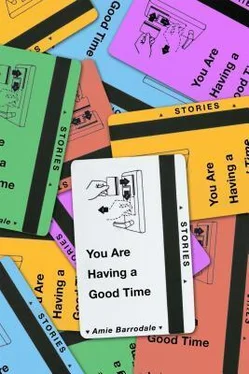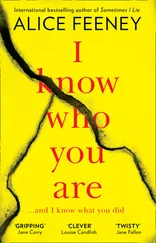“Mine, too.”
“I have the world’s softest voice.”
“No, I do.”
I stood up to get the wine, and he said, “You’re so attractive to me. Does everyone think so?”
I wanted to say no, but instead I just looked at him.
He said, “I bet weird guys fall at your feet.”
I said, “I have one beer in the fridge. We can share it.” I came back to sit with him. He said, “Can I touch your legs?” He was sitting Indian-style, and I put my legs between his knee and arm. He put both hands on me and said, “I feel guilty.”
“Why?”
“Well, you know I’m married.”
“I think you’ll always be married.”
“I love her.”
I sat on top of him. Without thinking about how you do it, I mean, without thinking about how other people do it, I touched him.
“Can you take my shorts off?” I said.
He took them off. I had a dress tucked into them. It came to my mid-thighs. He said, “What’s this?”
“Some weird— It was an impulse buy. It’s from India.”
What happened next was languorous and slow. We were like cats. We got into my bed. The drummer was lying on his back, and I was sitting on his lap with my knees bent. I leaned back and lay on his shins, and took his feet in my hands.
“You have a wet spot,” he said. “Is that from arousal?”
I lifted myself up and lay on top of him. I said, “Have you done this before?”
* * *
He went back on tour the next morning. He drove to Canada. He texted me a few nights later. I was already asleep, and I woke up to a string of them. In the first he was describing the people outside the venue when his show was over — a man in a Corvette and a streetwalker. Then later he wrote: “Everything comes crashing down in the back of a cab in Toronto listening to stupid jazz.” I knew it didn’t mean anything, but at the same time, I thought it meant his wife was pregnant and I’d never see him again. I wrote: “What do you mean?” A few days later he answered, “Ignore last text.”
From Canada he went to Europe, on a tour that ended in Russia. I can remember that I came undone, but not how or why. I wrote too often. Once, when he was in France, I woke up and he had answered twenty of my emails. It was strange. I was relieved. On the subway into work, I fell out of love, like I was the one who was being smothered. And by noon, I was terrified that I would lose him.
I went to lunch alone and drank. I came back from lunch and wrote to the drummer. I wrote, “This isn’t working,” and he wrote back immediately, “Okay you’re right.” Then for years, mostly what I did was email him, and try not to email him. I would count the days, and sometimes make it to a week. I would get drunk and text-message him about my mystical experiences and my homeless friends. He wrote me to describe a bar in Russia with shrines to Lenin and murals of Putin doing karate. He said the street dogs knew their stops, and he met a guy from a magazine who could not drink because he had been bitten by a rabid dog, and he was taking “dog pills.” When he got home, sometimes he would call me. It was always when he was blacked out and I was asleep. I never caught the calls. I then sent him a long email about the acorn lady and her barren three-million-dollar apartment. I described lawyers I overheard, monkeys I saw. Other drummers I had sex with. I told him a tree of plum blossoms fell on me and I saw some young men wearing outfits. I described the man at the wine store. I always wish there was a point to all those emails. Maybe there was. I don’t know. I do know. There was.
Finally I went to see his band perform live. By that time they were famous. My stepdaughters owned his albums. Before they played a song with the refrain “my head is wrong,” he seemed to get my eye. That was the last time we looked at each other.
“Last year, the visiting teachers got up and said something about themselves.”
“That was because you were all new,” Greer said. “You’d just gotten here.”
“But I don’t know who they are, I mean.” The student looked at Donald Burdon.
“Well, why not. Professor Burdon? Would you mind?”
Donald started. He was shivering and sweating. It was the middle of January, but he didn’t have an overcoat.
“Maybe you could say a little bit about your workshop?” Greer said helpfully.
“I’m going to do the ordinary thing.”
“Maybe you could turn and face them?”
Professor Burdon jerked up halfway out of his chair.
“I’m going to do the ordinary thing,” he said. “It’s going to be a workshop. I won’t deviate from the norm, of what you’ve come to expect.”
Professor Burdon sat down.
“Thank you, Professor Burdon,” Greer said. “What about you, Guillermo?”
Guillermo Silva stood decorously and made eye contact with the MFA students. He said, “My first instinct is to tell you to take workshop with Donald here. In fact, I’m going to teach Donald’s memoir in the spring. But you’ll think I’m being a lazy professor if I don’t encourage you to join my class. So, let’s see. I’m from the South, so I favor courtesy. I tend to like to work on novel excerpts for reasons I won’t get into right now. Beyond that, what can I say? You’re all here because you’re good. My hope is to help you write the story.”
Professor Burdon shot his cuffs. It sounded like he said, “Cocksucker.”
* * *
Donald Burdon and Benjamin Greer had met two decades earlier, in John Berryman’s poetry workshop. It was a two-year program, but Donald was in his fifth year, because he’d had to leave several times.
Berryman asked his twelve students to show up on the first day with an unsigned, typewritten poem. He collected the pages, shuffled them, and passed them around. Then the students went in a circle, reading one another’s work.
Greer’s poem was read third. It was the first time he heard his work read by somebody else. He realized, after a few words, that his poem was purple. It was self-aggrandizing. It pandered to John Berryman. But he wondered if it just seemed that way in the context of all these other student poems. He regretted his decision to get an MFA. “Poet school,” he murmured.
After the break, when each anonymous poem had been read, Berryman spoke a little. He asked the students what they thought of the experience, and said, “It’s easier to be honest when a piece is unsigned. Of course, there are some things we can never say, because they are secrets, but we can show our hearts.”
The students went in a circle praising lines and images from one another’s poems. When it was his turn, Greer looked squarely at Berryman and praised a prose poem about two Jewish men sharing a cup of tea. He said, “I love the image it evokes.”
Berryman said, “Really?”
“Yes, you know. How those little things will matter. It’s really rather extraordinary.”
“To me it seemed clichéd.”
“The cliché makes it extraordinary.”
Berryman raised his eyebrows. “Say more.”
Greer swallowed. “Often, when he is … worried … a man … a bearded man, will, you know, sort of scrape his hands through his beard.”
Berryman looked around at the other students. “Hm.”
The classroom door swung open, cracking against the wall. Donald Burdon stood in the doorway. He was drenched with sweat. He wore golfing shorts that were too small. He said, “I am so sorry,” and began to pass out one typewritten page to each student. It was his poem.
“I’m sorry I’m late,” he said as he gave a page to Greer. “I’m dreadfully sorry. Please, bear with me. Mr. Berryman, please accept my sincerest apology. Please bear with me. Accept my sincere apology.”
Читать дальше












